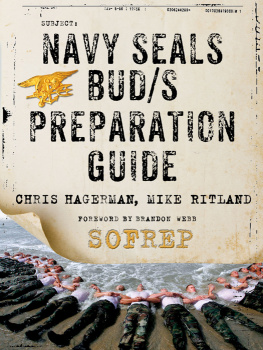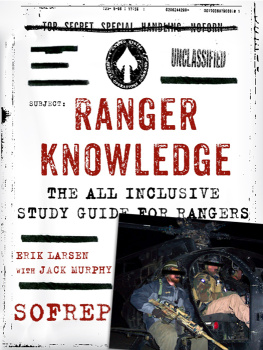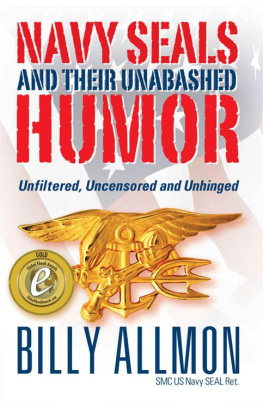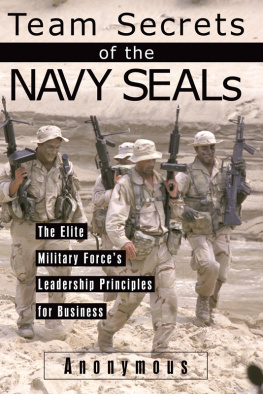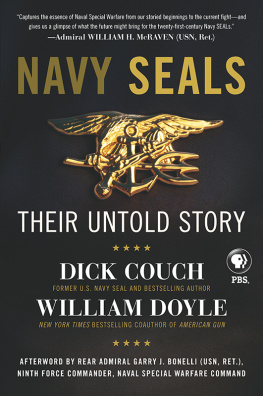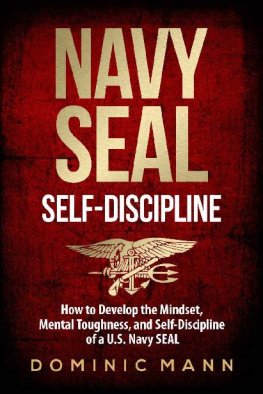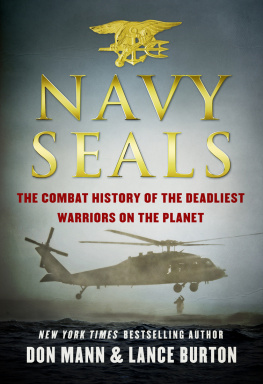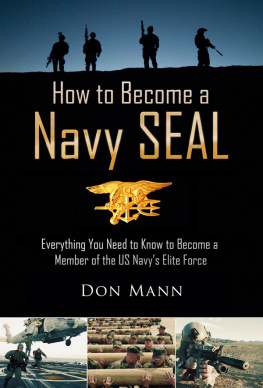The author and publisher have provided this e-book to you for your personal use only. You may not make this e-book publicly available in any way. Copyright infringement is against the law. If you believe the copy of this e-book you are reading infringes on the authors copyright, please notify the publisher at: us.macmillanusa.com/piracy.
Foreword by Brandon Webb
My favorite and most hated question I get asked about BUD/S is Can you give me any tips or secrets to making it through SEAL training? My usual response is two words. Dont Quit. Nobody likes a quitter, after all.
I honestly believe that when you show up to BUD/S you either have it or you dont. Admittedly there is a degree of luck involved when it comes to injuries, but you either have it in your heart and your head to succeed at all costs or you dont. Some of my classmates struggled with this, and some, like me, never had an issue with being on the fringe of quitting. This doesnt mean training was easy for me. It was one of the hardest things Ive ever done. I just knew that quitting was not an option with me.
This book is aimed at all types of students. The ones on the fringe will find it useful, and it may be just the information they need to push them one way or the other. For students who realize they would never quit, its a book that will increase their odds of graduating because theyll be better prepared and will have some tools to decrease the risk of overtraining that leads to preventable injuries.
Theres no secret to making it through training, but being informed will make you better prepared for whats to come. Thats the purpose of this book. The two former Navy SEAL authors both have experience as instructors. Youre in good hands.
Id also caution you to keep an open mind to the man to the left and right of you in training. If its one thing that BUD/S taught me, its that you cannot measure whats in a mans heart by how many push-ups he can do or how fast his run times are. Strength of heart and mind is what it takes to push through your perceived physical limits, and you cant measure this on some obscure questionnaire or a PT test. You can only measure it in the arena.
For those who read this book, go on to training know that theres honor in just showing up. Ive known some who decided that being a SEAL was not for them, and theyve gone on to be successful elsewhere. You should respect these men. They had the balls to show up when many did not, and that counts for something. For those of you who make it through the course, remember this, and this quote from TR, and be better men for it.
It is not the critic who counts; not the man who points out how the strong man stumbles, or where the doer of deeds could have done them better. The credit belongs to the man who is actually in the arena, whose face is marred by dust and sweat and blood; who strives valiantly; who errs, who comes short again and again, because there is no effort without error and shortcoming; but who does actually strive to do the deeds; who knows great enthusiasms, the great devotions; who spends himself in a worthy cause; who at the best knows in the end the triumph of high achievement, and who at the worst, if he fails, at least fails while daring greatly, so that his place shall never be with those cold and timid souls who neither know victory nor defeat. Theodore Roosevelt
Welcome to the arena of life, gents. Do well.
Brandon Webb, Navy SEAL (Class 215)
So you wanna be a Frogman

Navy SEALs urban combat, courtesy of the official Web site of the USN
Becoming a Navy SEAL is something that many young American men have aspirations of achieving. From the time they were young children running around with water guns or setting booby traps around the house, they have wanted to become one of Americas elite. As teenagers, they may have watched a special operations movie that lit the fire within their souls to become an operator. Then there are others, answering the call of duty after an event such as the terrorist attacks on September 11, 2001. If you are one of them, there are a few things youd better know up front. Whether your motive is patriotism, challenging yourself personally, or just wanting to be a part of one of the worlds most elite special operations units, the same advice applies: You had better come preparedprepared mentally, physically, and emotionally, or you will fall by the wayside like the other 70-plus percent who dont successfully complete the program. That percentage probably seems a bit daunting, and it is. This program is not for those lacking inner strength and mental fortitude. Becoming a SEAL is only attainable if you possess a never quit attitude that trumps all circumstances. With the right attitude and proper physical preparation, your odds of making it through this rigorous program will most certainly be increased. Then you, too, may be standing tall with the Navy SEAL Trident pin upon your chest.
BUD/S
What I am going to tell you here is not a matter of national security, nor is it even a secret in the simple sense. The information in this book is available by means of thorough research on the Internet, thanks to many years of media attention and recruiting ploys by high-ranking military brass. What I am going to tell you differs from your Internet research in that it is straight from the mouth of one who has been through the system: a rootin, tootin, shootin Frogman.

BUD/S students IBS run, courtesy of the official Web site of the USN
As a school or training program, whichever you choose to call it, BUD/S is truly in a class of its own. Basic Underwater Demolition/SEAL (BUD/S) Training takes place primarily on the sandy shores of the Pacific Ocean in Southern California at the Naval Special Warfare Center (NSWC). The average daily high temperature is 70 degrees. Tourists from around the world flock to the shores of this paradise to enjoy the sun and sand. If this sounds like a nice place to be, it is, unless you happen to be a BUD/S candidate. For you, that balmy temperature will be tempered by many trips into the Pacific Ocean to get wet and sandy. Although the ocean temperature averages around 65 degrees, I can promise you it will feel much colder after repeated visits.
In my opinion, one of the primary things that sets BUD/S apart as a training program is the instructor staff. BUD/S instructors are Frogmen; they come straight from the SEAL community. They are very current on whats going on at the team level and with our various combat and training operations overseas. They all go through an instructor training program both at the regular navy level and at the NSWC. They are picked for this duty based on proficiency in their jobs, ability to teach at the team level, personality, and, perhaps most significantly, their remaining operational life. The vast majority of instructors have a long operational life remainingthat is, for quite some time to come, they can and will be deployed overseas to do the work SEALs do. To put it another way, there is a

